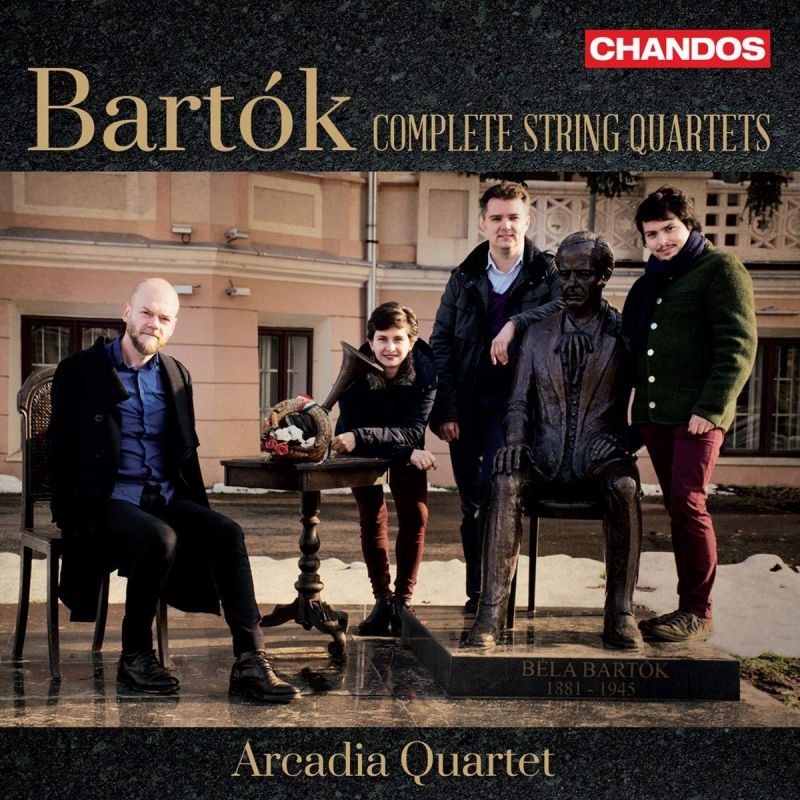BARTÓK Complete String Quartets (Arcadia Quartet)
View record and artist detailsRecord and Artist Details
Composer or Director: Béla Bartók
Genre:
Chamber
Label: Chandos
Magazine Review Date: 11/2018
Media Format: CD or Download
Media Runtime: 150
Mastering:
DDD
Catalogue Number: CHAN10992(2)

Tracks:
| Composition | Artist Credit |
|---|---|
| String Quartet No. 1 |
Béla Bartók, Composer
Arcadia Quartet Béla Bartók, Composer |
| String Quartet No. 3 |
Béla Bartók, Composer
Arcadia Quartet Béla Bartók, Composer |
| String Quartet No. 5 |
Béla Bartók, Composer
Arcadia Quartet Béla Bartók, Composer |
| String Quartet No. 2 |
Béla Bartók, Composer
Arcadia Quartet Béla Bartók, Composer |
| String Quartet No. 4 |
Béla Bartók, Composer
Arcadia Quartet Béla Bartók, Composer |
| String Quartet No. 6 |
Béla Bartók, Composer
Arcadia Quartet Béla Bartók, Composer |
Author: Richard Bratby
If that arouses expectations of raw, rustic abandon, put them aside. Cluj-Napoca is surrounded not by the wild mountains of Bram Stoker’s imagination but by softly rolling hills. And behind every interpretation in this civilised, wonderfully atmospheric cycle, there’s a sense of deep assurance that makes any preconceptions about folk fiddles feel slightly embarrassing. Take the long cello and violin solos in the nocturnal central movement of No 4. There’s an eloquent poise to the way Ana and Zsolt Török phrase their lines that relates this music directly to central European classicism, and if you’ve already listened to the first movement of No 1, you’ll have expected no less. The violins unfurl their opening sighs wistfully and inwardly: this is music that’s emerging from an unmistakably Romantic world.
In fact, these readings are so poetic and spacious that my first reaction to the opening movement of No 2 was ‘streamlined’ – so euphonious is the sound of the ensemble and so long-breathed their approach to Bartók’s slower music. Ensemble chords are ringing and ripe; cello and viola together generate a rich, velvety sonority to which the violins add a gleam that never entirely sharpens to a dazzle – not that it needs to here. Percussive pizzicatos and sul ponticello shivers are relished, but also controlled, and never played purely as effects. Chandos’s warm, slightly misty acoustic sets up a poetic atmosphere without blurring pianissimo detail.
True, you might prefer a more forensic approach to the single-movement Third Quartet or the jackhammer opening motif of the Fifth, but then perhaps you’d lose the doleful, quizzical aspect that the Arcadia Quartet give to the glissandos in No 3’s Ricapitulazione and the mood of tear-stained confession that they manage to imply in the background of even the faster movements of the Sixth Quartet. None of which is to deny that when the Arcadias catch the rhythmic groove of Bartók’s dance movements – the Alla bulgarese scherzo of No 5 has a particularly infectious swing – they can cut loose with positively Haydnesque verve.
There are certainly tauter, more focused Bartók cycles available: by comparison, the Heath Quartet’s recent cycle sounds precision-tooled. But if I was asked to recommend a Bartók cycle to a first-time listener intimidated by his spiky reputation, I’d send them straight to the Arcadia Quartet. Even for the aficionado, this spacious, big-hearted vision of Bartók as poet, dreamer and humourist has something distinctive and beautiful to say.
Discover the world's largest classical music catalogue with Presto Music.

Gramophone Digital Club
- Digital Edition
- Digital Archive
- Reviews Database
- Full website access
From £8.75 / month
Subscribe
Gramophone Full Club
- Print Edition
- Digital Edition
- Digital Archive
- Reviews Database
- Full website access
From £11.00 / month
Subscribe
If you are a library, university or other organisation that would be interested in an institutional subscription to Gramophone please click here for further information.




